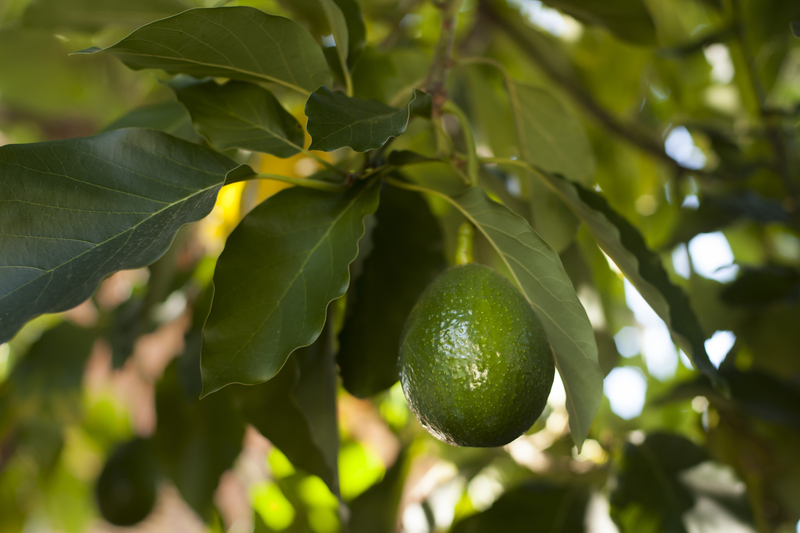Elevate Your Cooking with Homegrown Herbs from Your Garden
Posted on 19/06/2025
Elevate Your Cooking with Homegrown Herbs from Your Garden
Discover how cultivating your own fresh herbs can transform your culinary creations, improve flavors, and provide health benefits--all from the comfort of your garden.
Why Grow Your Own Herbs at Home?
If you're passionate about food, there's no greater way to elevate your cooking than by using homegrown herbs from your garden. Fresh herbs impart vibrant flavors, tantalizing aromas, and vivid colors to your dishes, turning ordinary meals into gourmet experiences.
Imagine stepping outside your kitchen, harvesting lush basil, fragrant rosemary, or zesty cilantro--straight from the soil to your plate. Homegrown culinary herbs make this a reality, saving you money, reducing food miles, and giving you confidence in the quality of your ingredients.

The Top Benefits of Homegrown Herbs for Cooking
- Unmatched Freshness and Flavor: Herbs lose their potency quickly after harvesting. Growing them at home ensures peak flavor and aroma in every dish.
- Cost-Effective & Sustainable: Say goodbye to expensive supermarket herb packets that wilt in days. Your herb garden is an investment with continual returns--and less plastic waste.
- Healthier Meals: Fresh herbs from your garden are untainted by preservatives and pesticides, while their nutrient content--like vitamins A, C, and K--remains intact.
- Personal Satisfaction: There's immense joy in nurturing your herbs from seed to harvest, then tasting the fruits of your labor in your cooking.
- Year-Round Access: With the right choices, you can cultivate common garden herbs indoors or out and enjoy them all year long.
Selecting the Best Herbs for Your Garden
Whether you have a backyard plot, balcony containers, or a sunny windowsill, you can successfully grow a wide variety of culinary herbs at home. Here are the most popular garden herbs for elevating your cooking:
Basil
A must-have for Italian dishes and summer salads, basil thrives in warm conditions. Homegrown basil is essential for pesto, tomato sauces, and fresh caprese salads.
Rosemary
This perennial herb adds earthy flavor to roasted meats, potatoes, and breads. Rosemary is robust, drought-tolerant, and keeps giving for years.
Parsley
Unbeatable as a garnish or ingredient, parsley is both visually appealing and nutritious. Use homegrown curly or flat-leaf parsley in soups, salads, and sauces.
Cilantro (Coriander)
Vital for salsas, curries, and Asian dishes, cilantro brings a bright, citrusy note to your meals. It grows quickly and can be harvested within weeks.
Mint
Fresh mint is a game-changer for teas, desserts, and savory Middle Eastern dishes. Plant it in containers, as it spreads enthusiastically.
Thyme
Thyme's subtle, earthy notes work well in marinades, roasted or grilled dishes, and stews. It's a hardy perennial that grows well in most climates.
Oregano
Oregano is a pizza and pasta essential. Grow your own for the freshest sprigs to sprinkle on Mediterranean or Mexican fare.
Chives
Chives add a mild onion flavor to salads, baked potatoes, and eggs. They're easy to grow and can be snipped regularly for ongoing harvest.
How to Start Your Herb Garden
Choose the Right Location
Most herbs need at least six hours of sunlight daily. A south-facing window, balcony, or garden bed works well. Ensure your herbs have well-drained soil to prevent root rot.
Container vs. Ground Planting
- Containers: Perfect for patios, balconies, or indoor gardening. Use pots with drainage holes and quality potting soil for a thriving mobile herb garden.
- In-ground beds: Ideal for larger harvests. Amend soil with compost and group herbs with similar water needs for easier care.
From Seeds or Seedlings?
Growing herbs from seed is rewarding and economical. Start seeds indoors in early spring or sow directly outdoors after frost risks pass. Alternatively, purchase seedlings for a quick start--perfect for impatient cooks eager to elevate their culinary creations using homegrown herbs!
Herb Garden Care Tips for Maximum Flavor
- Water wisely: Overwatering can be fatal. Let soil dry between watering, especially for sage, thyme, and rosemary.
- Harvest often: Regular snipping (at least weekly during peak season) encourages bushier growth and prevents herbs from flowering and turning bitter.
- Pinch off flowers: As soon as buds form, pinch them; flowering can reduce leaf flavor and growth.
- Mind the seasons: Some herbs are annual (basil, cilantro), while others are perennial (rosemary, oregano). Adjust planting and overwintering accordingly.
- Feed sparingly: Excess fertilizer leads to bigger plants but weaker flavor. Use compost or organic feeds for best taste.
Elevate Everyday Cooking with Fresh Garden Herbs
Fresh garden herbs add nuanced flavors and impressive visual appeal to countless dishes. For the best culinary results, follow these tips to maximize flavor:
- Add delicate herbs at the end: Soft-leaved herbs (basil, parsley, cilantro) are best sprinkled on just before serving to preserve their volatile oils.
- Cook woody herbs early: Hardier herbs (rosemary, thyme, oregano) can withstand longer cooking times and infuse dishes with robust flavor.
- Chop just before use: Cutting herbs releases aromatic oils. Chop them last and add to your recipe promptly.
- Muddle for extracts: For drinks and sauces, bruise herbs with a mortar and pestle to extract essential oils.
- Infuse in oils or vinegars: Store herbs in olive oil or vinegar to create custom dressings that add another dimension to salads and marinades.
Creative Ways to Use Homegrown Herbs in Cooking
- Herbed Butters: Mix chopped chives, parsley, or tarragon with unsalted butter for steaks, bread, or vegetables.
- Savory Oils: Steep thyme or rosemary in olive oil for drizzling over pizza or grilled meats.
- Fresh Pestos: Beyond basil, try cilantro, parsley, or mint in pestos for pasta, grains, or sandwiches.
- Infused Waters and Cocktails: Add sprigs of mint, basil, or lemon balm to drinks for a refreshing, aromatic twist.
- Homemade Herbal Teas: Steep mint, lemon verbena, or chamomile for soothing and healthful infusions.
Health Benefits of Homegrown Culinary Herbs
Beyond flavor, fresh herbs from your own garden serve as a potent addition to your health regime. Many are rich in antioxidants, have digestive and anti-inflammatory properties, and support immunity.
Nutritional Powerhouses
- Basil: Contains vitamin K, magnesium, and antioxidants that can help combat oxidative stress.
- Mint: Known for aiding digestion and relieving headaches.
- Parsley: Packed with vitamin C, A, and folate, supporting immune function.
- Rosemary: Rich in compounds believed to support memory and circulation.
Best of all, because you control your growing environment, you can minimize or entirely avoid unwanted chemicals and pesticides.
Sustainability and Environmental Benefits
Growing herbs at home is not just beneficial for your plate--it also has a positive environmental impact.
- Reduces Food Miles: No need for plastic-packaged, long-distance supermarket herbs; simply harvest what you need, when you want it.
- Reduces Food Waste: Pluck a few sprigs as needed, avoiding the common pitfall of wilted supermarket herbs going bad in your fridge.
- Encourages Pollinators: Flowering herbs such as chives and thyme attract bees and butterflies, supporting local biodiversity.
Preserving Your Homegrown Herbs for Year-Round Use
Extend the benefits of your garden by preserving summer's bounty for use throughout the year.
- Freezing: Chop herbs and freeze in ice cubes with a bit of water or olive oil--perfect for soups and sauces.
- Drying: Hang bunches upside down in a dry, well-ventilated space, then store in airtight containers.
- Herb Salts and Vinegars: Mix finely chopped herbs with salt or infuse vinegars for seasoning and dressings.
- Pesto and Compound Butters: Blend herbs into pesto or fold into butter, then freeze for later enjoyment.

Frequently Asked Questions About Growing Culinary Herbs at Home
Can I grow herbs indoors?
Absolutely! Many culinary herbs thrive on sunny windowsills or under grow lights. Basil, chives, mint, thyme, and parsley are especially reliable for indoor gardens.
How much maintenance do homegrown herbs need?
Most herbs are easy to grow. Regular watering, occasional feeding, and frequent harvesting are generally all you need. Avoid overwatering and always place in good sunlight for best results.
How do I maximize flavor in my cooking with garden herbs?
Use fresh, harvest at the right stage, add delicate herbs at the end of cooking, and be generous--you'll notice the difference in every bite.
What's the best way to store my harvested herbs?
For short-term storage, place stems in a jar of water (like a bouquet) in the fridge. For longer term, try drying, freezing, or infusing as described above.
Conclusion: Elevate Your Culinary Adventures with a Home Herb Garden
Few changes in the kitchen are as rewarding as incorporating fresh, homegrown herbs from your garden into your daily cooking. Not only do they bring out the best flavors and aromas in your recipes, but they also contribute nutrients and beauty to every meal.
Begin your journey today--even a single pot of basil or rosemary can transform your culinary results. As your success grows, experiment with others. Your homemade dishes will reach new heights, and you'll find yourself inspired to cook more, try new recipes, and savor the simple pleasures of garden-to-table eating.
Transform your meals. Start your culinary herb garden today--and elevate every dish with the freshest, most flavorful herbs from your own home!
Latest Posts
Get Inspired: Designing Awe-Inspiring Seating Areas in Your Garden
Conquer Weeds Effortlessly with 3 Innovative Tips
Overcoming the Challenges of a Windy Garden Environment

